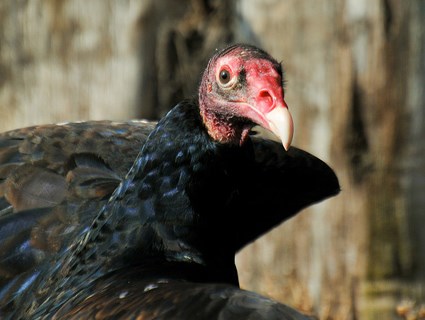When my work at Port Discover expanded to include writing this column a year ago, I had no clue how it would alter my vision of the world. In order to find subjects to explore and write about, I had to adjust my focus to include the science topics that I encounter and observe daily. Things I used to ignore have become food for investigation.
Today, for your Sunday morning edification, my topic is turkey vultures. The woods next to our house now host approximately fifty of the carrion-eating carnivores every evening. Why? I haven’t discovered that yet.
One Sunday morning recently, I heard and saw my neighbor across the canal standing on her back porch in her bathrobe loudly beating on a pan with a spoon in an effort to scare the birds away. Two weeks after that, I was standing on my back porch ringing a large antique cowbell trying to accomplish the same.
I’m sure the vultures were laughing, and they weren’t scared a bit by either one of us. There is just something unnerving about the way they sit in the trees silently looking down. You begin to wonder what they are waiting for. Because they have no voice box, the only sound they make is the slight flapping of their wings as they settle down for the night in the trees.
 There is a Turkey Vulture Society whose site has many interesting facts about the helpful scavengers. Also, Cornell University has done much research on the birds and other species, which you can find on their site.
There is a Turkey Vulture Society whose site has many interesting facts about the helpful scavengers. Also, Cornell University has done much research on the birds and other species, which you can find on their site.The Migratory Bird Treaty Act of 1918 protects these year round residents of our area, and it is against the law to shoot one. They are raptors, and serve mankind through their habit of eating dead animals.
Although television westerns used to portray them as evil, some religious groups such as Tibetan Buddhists honor them, and depend on them for the removal of their dead. They believe that vultures release the soul from the body.
Often incorrectly called buzzards, they are unaggressive and non-confrontational, and unlike their cousins the black vulture, they do not kill. Often feeding on road kill, washed up fish, as well as rotten pumpkins, and juniper berries, they politely take turns eating. They can soar gracefully for hours using thermals of warm rising air for lift.
It is some of their other characteristics that are not too appetizing. Readers with weak stomachs might want to stop here.
Their heads are almost bald which allows them to eat without getting remains on them. Frequently, they urinate on themselves, not only for cooling, but also to kill the harmful bacteria that are on their feet. If they are scared or threatened, they vomit in order to ward off the enemy with the smell.
I trust that they will move on eventually. In the mean time, I’m considering becoming a vegetarian.
